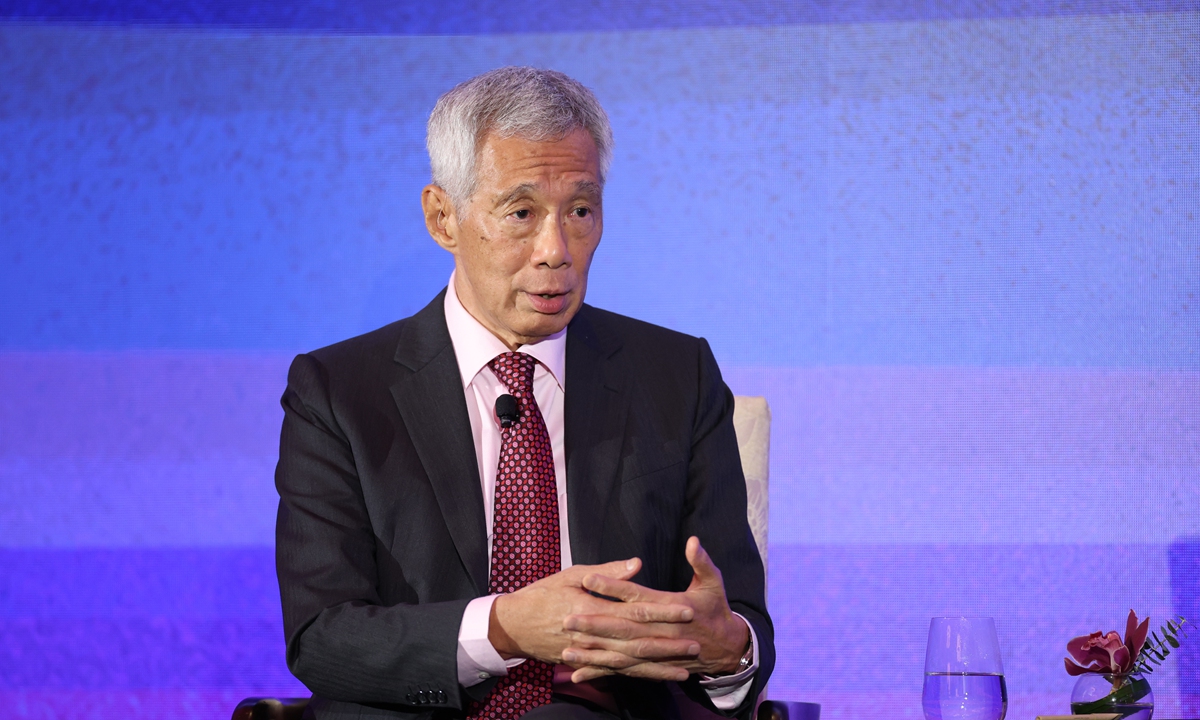
Lee Hsien Loong speaks during an interview at the Bloomberg New Economy Gala Dinner in Singapore, on Wednesday, Nov. 8, 2023. Photo: VCG
The US postponing its tariffs on other countries for 90 days might sound like a reprieve, but people should be bracing themselves for the US to not only move forward with the tariffs, but to also take stronger measures in time to come, said Senior Minister of Singapore Lee Hsien Loong on April 14, according to the Strait Times.
In a one-hour speech ahead of a dialogue with union leaders, Lee said US President Donald Trump and his team fundamentally believe that America's problem has to do with its trade deficit with the world, and a need to rebuild manufacturing back home.
"Trump believes it, his team believes it, many of them, and these are goals which are going to be very difficult to achieve, so we must expect him to continue to pursue this objective," he said, noting that this means the US can be expected to take more steps over time, with very major consequences for many countries, including Singapore.
During the speech, Lee noted the strong consensus within the US that China is a pacing challenge, and its determination to prevent China from overtaking it.
But China is determined to grow and take its rightful place in the world, and the result is a fundamental contradiction that is not going to be easily resolved, he added.
Lee noted that the US postponed its reciprocal tariffs against other countries, but not those against China. US tariffs on China have reached 145 percent, and China's tariffs on American goods have reached 125 per cent. This will effectively kill off bilateral trade, as the tariffs would be too much for businesses to swallow.
Should the tariffs take effect, countries can be expected to retaliate with their own reciprocal tariffs, as in the case of China and Canada. The result would be a downward spiral and an even worse impact on global trade, added Lee.
Such a situation would mean whole business models suddenly disappearing, and firms left with a surplus of workers and wondering how to look after them, said Lee.
"That can very quickly lead to recession - recession in the US itself, and impact elsewhere too," Lee said. "So this is going to be a burden on businesses, on consumers, on the global economy."
On Singapore's response, he said that the rest of the world still has a fair shot at maintaining the multilateral trading system even without the US, giving the example of the Trans-Pacific Partnership, which Trump had pulled out of early in his first term, in January 2017.
"So America leaves the game, (we) can still carry on. And in the same way, the global trading system, America doesn't want to play by the rules any more, but the other countries, we can maintain the system as we trade with each other," he said.
Singapore, like many countries in the world, has benefited greatly from economic globalization. Without free trade, the country would lose its own advantages, Zhou Mi, a senior research fellow at the Chinese Academy of International Trade and Economic Cooperation, told the Global Times, noting that Lee's concern may be shared by many countries, because global trade is inherently based on mutual trust and respect among all parties. The way the US has acted this time is a completely unilateral move to change the existing rules, which is unsustainable.
As for Lee's remarks that "America leaves the game, (we) can still carry on," Zhou believed that this is a hypothesis. However, although US is indeed a big presence in global trade and the economy, if a participant in this "game" arbitrarily changes the rules, then other participants may seek to formulate rules different from those of the US. In this case, it would be highly destructive to the US and may even put the country in isolation.




